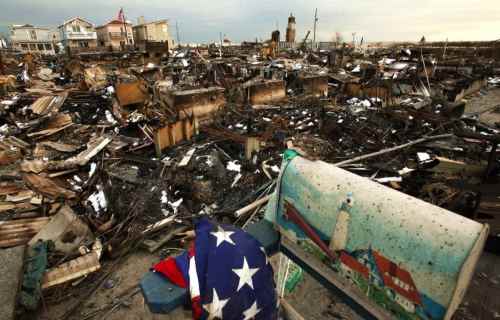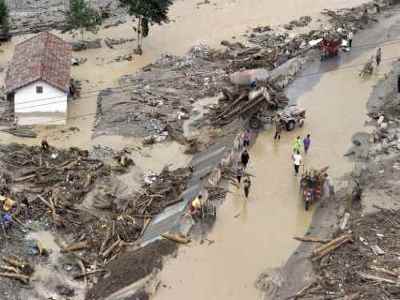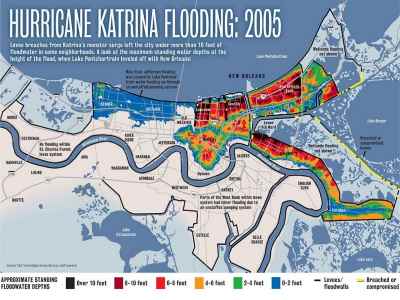Disaster Preparedness: How To Get Ready for The Worse
Do you ever think about disaster preparedness? Let’s say that it’s a nice summer afternoon, the sun shines, the sky is crystal blue, the birds sing, everything is green; does the disaster preparedness thought comes through mind? We know the answer is going to be no in 99.9 percent of the cases. Maybe it’s a bit extreme to ask you to think about a bad situation when everything is nice and pink but the idea of being prepared for a disaster should be very present in our minds.
You never know what and when is going to happen and an untrained person will be among the first victims. If you have a family it’s your duty to protect them and train them to protect themselves. We’re sure you tell your kids not to talk to strangers, why not talk to them about disasters too?
It will probably never going to happen. If this is the first response that comes to mind when someone tries to talk about disaster preparedness, it’s time to change your attitude. Disasters don’t hit specific areas and they don’t protect anybody. How would you react if tomorrow there would be an F5 tornado alert in your area? What would be the first thing you would do when you hear this news? How do you make sure your entire family gets out of this alive? You think you would survive such a monster?
There are more than tornadoes you need to prepare for. The Earth is changing and the Universe around us is changing too. You, your house and your property sit on a planet that rotates at incredible speed around a burning planet. Simply by knowing that, you should consider disaster preparedness your number one free time activity. The magnetic poles of our planet are shifting and no one can predict when this is going to happen.
The only thing scientists can say for sure about this activity is that is going to produce countless disasters and losses in human lives. The Sun emits every 11 years powerful solar explosions that increase in intensity with every cycle. Such an explosion could fry all our electronics and communication systems and send us back to Medieval Times in a few hours. Can you find your way home without using a GPS? Do you know where every member of your family is going to be in a situation like this, without using a phone?
Times are changing and we have to be prepared for this. We don’t mean to scare you but disasters may happen every day. People die in disasters and many can have a better chance at survival if they are prepared. Knowing how to stay calm and how to react under stressful conditions is a valuable lesson that needs to be thought before the disaster strikes. We’re not talking just about tornadoes, earthquakes, hurricanes, extreme temperatures and other natural disasters here. We’re also talking about nuclear bombs, gamma ray poisoning, EMP attacks and so on.
RELATED : Emergency Food – How To Store Water , Survive Food Crisis , Emergency Preparedness Kit
How disaster preparedness can help you
History teaches us many useful things, which is why we decided to talk about some of the worst disasters that ever happened on our planet. People tend to forget bad situations once they reach safety but these should be remembered. It’s a way to make sure disaster preparedness is an active thought in our minds.
Disasters are usually cataloged by the number of victims and amount of total material losses. There may have been even worse disasters in our planet’s history but we only have access to those who were registered in archives. Regardless the way they are cataloged, the disaster you actually have to go through will be the worse for you.
The earthquake that hit Egypt in 1201
Earthquakes are some of the trickiest natural disasters ever. It’s difficult to predict them in time to evacuate and they don’t respect any patterns. There can be different movement directions (up and down, left to right, up and down then left to right) in an earthquake which weakens buildings’ structure making them collapse.
The deadliest earthquake in history was recorded in Egypt and Syria on July 5th 1201. This disaster killed over 1.1 million people and was felt in many major cities in the near east. The material destructions were immense and the reconstruction took extremely long.
We know that 1201 is a very long time ago and probably no one actually remembers what happened but it’s important to mention this event. If people would’ve been prepared for such a situation and buildings were built to resist high magnitude earthquakes maybe the number of victims would have been smaller.
The best thing you can do when everything around you moves is to find a sturdy piece of furniture to get under. It is not recommended to try and get out of the building, or to stay in the door frame. Try to find a desk or a big table to crawl under and wait for the movement to stop.
After the earthquake stops try to get out but be on the lookout for pieces of ceiling that may still fall. If you get blocked under the piece of furniture and can’t get out try to make noise to attract someone’s attention. Having an emergency whistle will help a lot in a situation like this.
The most important thing during an earthquake is to try to stay calm. If you don’t let emotions get in the way, you’ll be able to assess the situation and find a good place to take cover in time.
These three old lessons will ensure your children will be well fed when others are rummaging through garbage bins. Click here to learn all about the 3 skills that will help you thrive in any crises situation.
Don’t wait until food becomes scarce; start preparing for the future now by becoming as self-reliant as possible. Your long-term chances of survival could very well depend on your ability to feed yourself and your family without relying on someone else.
The deadliest flood in China
Floods are normal natural events that can happen in any region of the globe. It simply happened that Chinese people would experience the worst one yet. From July to August 1931 and following a severe drought that lasted for two consecutive years, torrential rains suddenly started in the country. As a result, three major rivers flooded killing almost 4 million people and destroying crops on a wide area. The destruction produced by this flood was continued by famine due to destruction of rice crops.
We don’t say that this situation could have been avoided; Mother Nature doesn’t like to play games she simply strikes. Still if people would have known how to react in case of flooding there might have been fewer victims. Also if everyone would have considered building an emergency food supply the famine could have also been avoided.
Floods are hard to avoid when they have already started which is why it’s important to get the warnings in time. Local authorities issue warnings to inform the population when it’s time to evacuate. Make sure that you have a radio or a TV on all the time and listen for weather forecasts.
If the rain doesn’t stop you should be prepared to leave any time. Try to gather anything you have around the house so they won’t be taken by water and move everything of value as high as possible. Valuable papers, photographs, anything that might get destroyed by water should be packed in plastic bags and hanged by the ceiling.
You should always have a go to bag prepared with food and fresh water that you can grab and go. Don’t try to stay behind when the authorities say it’s time to evacuate! If the flood gets you by surprise, try to get to higher ground. Climb on anything you see and if you are in the house go to the roof. Never try to drive through a flood because you can’t see what’s under the water. If your car gets stuck in the middle of the torrent it will be extremely difficult to get to safety.
RELATED : What It’s Like to Live Without Electricity
Hurricane Katrina in 2005
This is a disaster we all heard of and we can still remember how bad it was. It hit in 2005 on the Gulf Coast and it is considered to be the sixth stronger hurricane to ever hit United States. The damages’ cost was almost 81 billion dollars which made this to be one of the costliest reconstructions ever.
When such a wrath hits it’s hard to keep calm but it’s the only way you’ll get out of it alive. Try to make sure you have time to leave before the hurricane reaches your location and go to a shelter or stay with a friend. Many people don’t realize how important warnings issued by government and local authorities are. Don’t try to remain behind and guard your house. If it is destroyed in the hurricane you will be able to build a new one but if you lose your life, no one will be able to revive you.
There are other recent examples of natural disasters that the entire world heard of like the Haiti earthquake that happened in 2010 taking over 200.000 lives or hurricane Andrew in 1993 that made 27 billion dollars in destructions. These are extreme examples of natural disasters but even a small, local one can be frightening when you’re not prepared. A local, spring flood can also take human lives if disaster preparedness is not taken seriously.
Safety measures you need to take
When a disaster announces itself you have to consider two different sets of safety measures:
- one for your family
- one for your home
House disaster preparedness
The first step you make in protecting your house against a major natural disaster is insurance. Make sure to insure your house for the most frequent natural events that happen in your area (floods, earthquakes, fire, hurricanes, etc). Sometimes it’s hard to get a good insurance for something that may actually happen (not the system people selling insurance agree) but there are other solutions that your government may help you with. Make sure to get all your information before signing an insurance deal.
Other things you can do to protect your house against disasters:
- Reinforce the door frame and the door – these elements are the first to break in case of powerful winds and earthquakes;
- Reinforce cracked walls and fix any cracks in the foundation – any small crack is a weakness an earthquake is going to explore;
- Use shutters to protect windows against powerful winds and heavy rain;
- Try to build small dams around your property that will stop any floods from invading your house;
- Build a tall foundation in case you live in an easily floodable area;
- Reinforce your roof so a powerful wind couldn’t snatch it away – if a tornado manages to take the roof, the walls will collapse;
- Anchor bookcases, file cabinets, large mirrors, and anything else that might collapse and hurt someone during an earthquake;
- Gas and water lines should be reinforced with flexible connections that won’t break during an unusual movement of the house. Actually, gas lines that break during an earthquake produce a significant amount of damage;
- Make sure to cut any weak or old trees from around the house. If these are pulled out by a strong wind they might land on your house.
These are just a few basic safety measures you can take but if you’re interested in finding out more you can always talk to local authorities and ask for a disaster preparedness plan. They should be able to offer you all the necessary information.
Build and make your own energy source
Disaster preparedness for the entire family
If you want to learn from a professional, you can take courses where the entire family will learn about how to stay safe and calm during any type of disaster. Otherwise, there are plenty information out there that can help you teach your family about preparedness.
The key words here are preparing in advance because when the disaster strikes, there’s no time for lessons and discussions. If you know there’s a flood season in your area or there are frequent earthquakes, don’t wait for the event to happen. Start with at least a few weeks before everything starts going downhill.
Here are a few points that you need to go through with your disaster preparedness plan regardless of the disaster you are preparing for:
- make a disaster plan with your entire family and make sure everyone understands it completely;
- talk about a common safe place where everyone should go in case you are not together when the wrath happens;
- talk about escape routes out of the house and out of danger’s way;
- establish a safe person each one of you trusts. This person will be your common point in case you get lost and there is no possibility to communicate with each other. Teach every member of your family how to use a radio or a satellite phone;
- discuss about shelters close to your surroundings and teach everyone the shortest way to get there;
- practice your plan at least twice a year. This way it will be easier to learn and apply in a real situation;
- teach everyone about the survival kit and what it should contain. It should be packed and ready to grab and go;
- give every member of your family an emergency whistle and teach them how to use it. This may prove very efficient in violent situations too;
- talk about how to attract the attention of rescuers in case someone is caught under debris or a fallen building;
- teach everyone how to offer first aid and how to use a first aid kit to take care of their own wounds;
- learn about self defense and techniques that can help you get rid of an attacker. During bad times, bad people emerge and you need to be prepared for any situation;
- talk about finding food and water in case you get isolated in the wilderness. You should know how to purify water, especially if floods are frequent in the area. Floods contaminate safe sources of water making them unusable. Teach everyone how to use tablets and filters to purify water;
- talk about behavioral rules in a shelter so everyone would know how to behave in case you have to go in one. Sometimes it’s difficult to cope with the idea of so many people gathered together in a small place.
A Self Sustaining Source Of Fresh Meat,Vegetables And Clean Drinking Water
There are lots of other things to discuss according to the disaster you are most likely to experience but these should be at the top of your list.
Disaster preparedness is not just a paranoia some people experience, it’s a real thing and it’s time everyone realized this. It’s absolutely normal to be skeptical at the beginning but as you know more, the better you will be able to protect yourself and your family.
As you could see, sometimes disasters can be of catastrophic proportions, killing millions and leaving behind nothing but pain and destruction. By talking to your family about this and by learning survival techniques, you prepare them for such an event, making the initial impact somehow easier. It’s time you leave your doubts aside and start your disaster preparedness today!
RELATED : When The Economy Collapses It Will Be Fast And Hard – What to Do When Everything Goes Crazy
SOURCE : survival-mastery.com
The Lost Ways (Learn the long forgotten secrets that helped our forefathers survive famines,wars,economic crisis and anything else life threw at them)
Survive Attack to Our Power Grid System (Weapon That Can Instantly End Modern Life in America)
Survival MD (Best Post Collapse First Aid Survival Guide Ever)
Backyard Innovator (A Self Sustaining Source Of Fresh Meat,Vegetables And Clean Drinking Water)
Blackout USA (EMP survival and preparedness)
Conquering the coming collapse (Financial advice and preparedness )
Liberty Generator (Build and make your own energy source)
Backyard Liberty (Easy and cheap DIY Aquaponic system to grow your organic and living food bank)
Bullet Proof Home (A Prepper’s Guide in Safeguarding a Home )
Family Self Defense (Best Self Defense Strategies For You And Your Family)
Survive Any Crisis (Best Items To Hoard For A Long Term Crisis)
Survive The End Days (Biggest Cover Up Of Our President)
Drought USA (Discover The Amazing Device That Turns Air Into Water)




